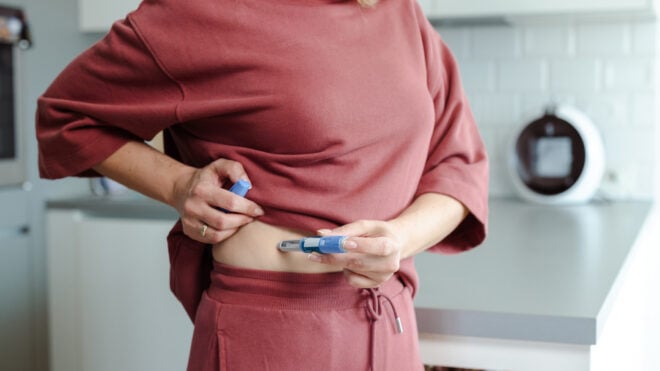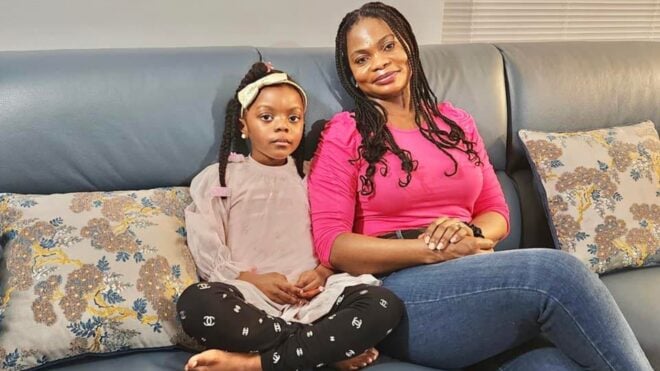We are often told that there are many steps we can take to lead healthier lives. Doctors and nutritionists suggest healthier, sugar and carb-free diets, and fitness gurus recommend vigorous at-home exercises.
And while we're usually very familiar with the inner workings of our own bodies, and see signs that tell us we're pretty healthy already, there's always more we can do.
In an exclusive guide below, we explain the most important health risks for both men and women in every age group. After looking at these risks, we list out the most crucial checkups that you may need to pay attention to.
Even if you feel absolutely fine and still see your primary doctor for regular checkups, it might be time to start considering seeing specialists to help you detect certain diseases, cancers, and physical illnesses.
This way, you can always stay one step ahead with early detection and prevention.
Scroll further to start reading about the crucial health checkup list in your own age group. Please let us know your thoughts or concerns in the comments below!
1. Top Risks In Your 20s

The main medical condition that women in their 20s face is high cholesterol. Even though it's commonly associated with older adults, children, teens, and young adults can experience cholesterol buildup in the blood vessels — an issue that is commonly linked to high blood pressure and diabetes.
Make sure you get your cholesterol levels checked comprehensively at least once every five years, starting from age 20.
Melanoma, the leading form of cancer in adults aged 25 to 29, is one of the most ferocious cancers out there. It's important that you see a dermatologist at least once a year for a skin checkup. You should also wear sunscreen daily to protect your skin from the sun.
Starting from age 20, women should also have annual pelvic exams and Pap smears, to check for signs of cervical cancer.
Young men should have annual testicular exams starting from age 20, as testicular cancer occurs most often in men aged between 20 and 39.
In addition, make sure to have your blood pressure checked during every doctor visit, MedlinePlus suggests. Despite the problems and illnesses that are bodies are susceptible to, we can continuously stay one step ahead with routine checkups and early detection.
2. Top Risks In Your 30s
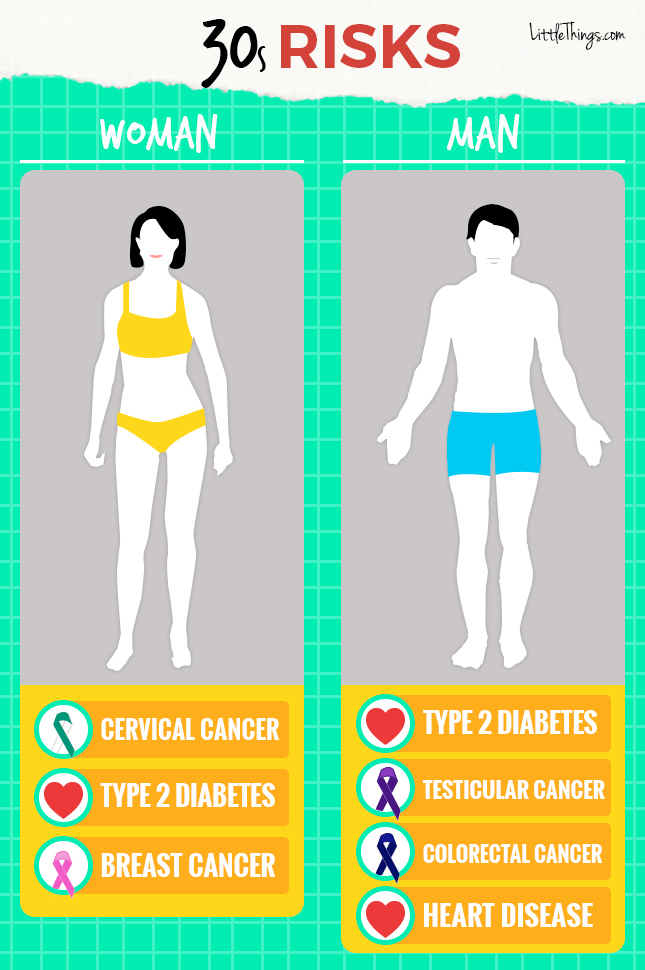
One of the greatest health threats for women in their 30s is cervical cancer. Continue to have annual pelvic exams and Pap smears to check for any abnormalities.
Men should beware of symptoms of heart disease — heart disease is the number one killer of men over 35, according to the CDC.
Men in their 30s should continue having annual testicular exams and start having routine screenings to check for colorectal and prostate cancers, especially if doctors have previously deemed you to be high-risk.
Women should now start having annual breast exams (they will most likely be performed together with your pelvic exams). Many women will also start getting mammogram screenings, especially if breast cancer runs in their family.
By now, both women and men should get blood sugar tests at least every five years. This is to check for type 2 diabetes, which at least one out of three people will apparently develop in their lifetime, according to a report by the CDC.
3. Top Risks In Your 40s
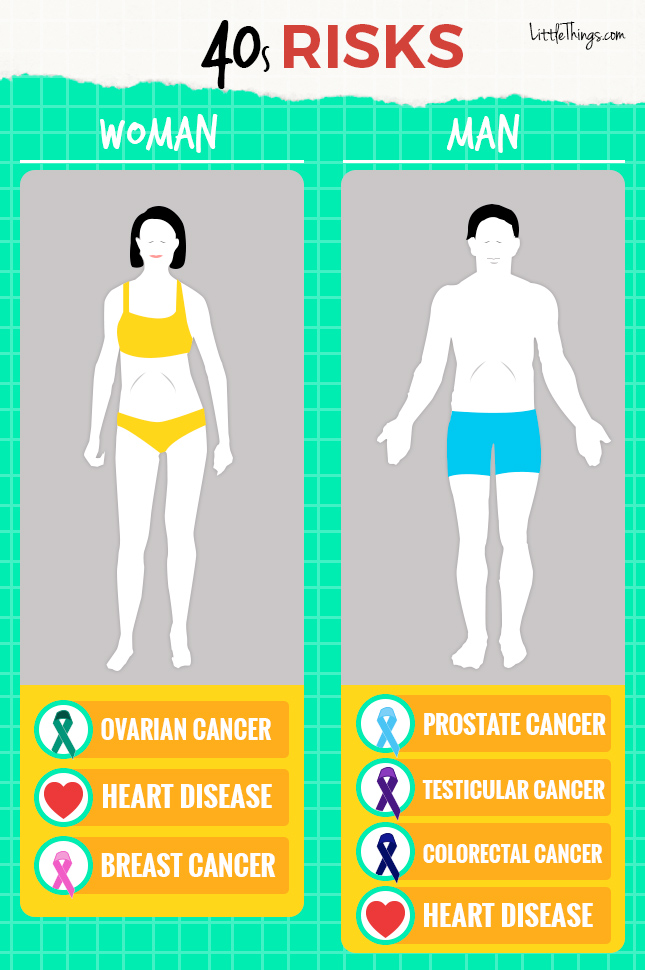
Once in their 40s, both men and women will more evidently experience the effects of physical aging, and will be at an increased risk of many forms of cancer.
Women should now get annual mammograms, as breast cancer is the number one cancer in women in their 40s.
For women who are deemed high-risk by doctors, or who are postmenopausal, it's crucial to have ovarian screenings every three years. Dubbed the "silent killer," ovarian cancer typically has no symptoms until it has progressed to an advanced stage, according to About Health.
Like women, men should continue to undergo routine blood sugar and cholesterol testing, but should be more careful — men over 40 are three times as likely to have heart disease than women.
In addition, there will be a continued risk for testicular cancer. Men in their 40s should definitely start having routine prostate exams, especially if there is trouble urinating or pelvic pain.
Men should also receive annual colorectal screenings, as colorectal cancers account for a daunting 60 percent of cancers in men over 40.
4. Top Risks In Your 50s
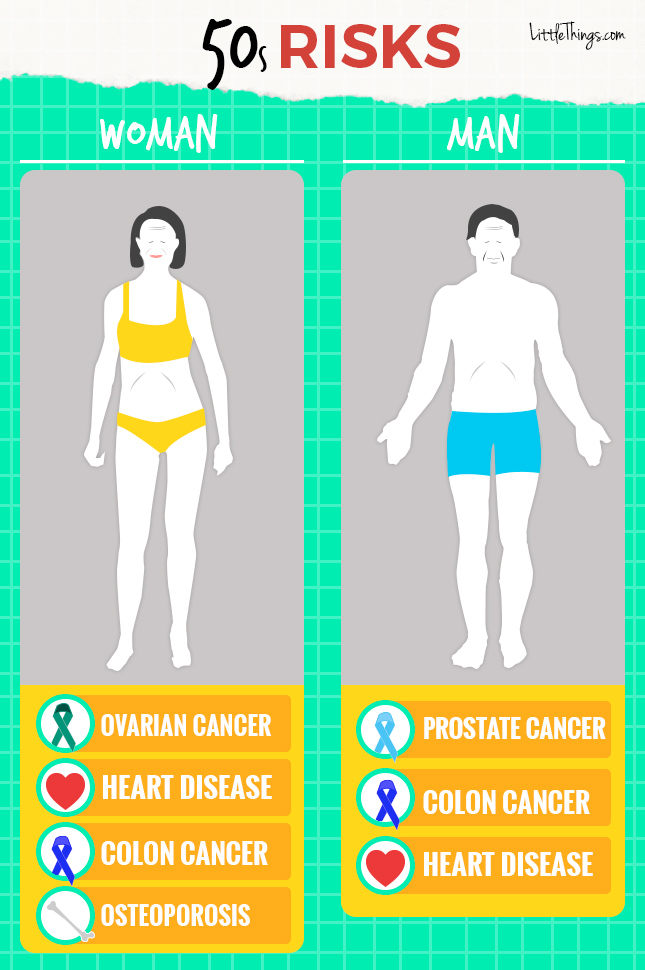
Heart disease is the number one killer in both women and men over 50, so consider getting routine coronary screenings, blood sugar and cholesterol tests, and heart disease screenings.
Women should start having bone density tests every three years to screen for osteoporosis. One in three women over 50 will experience bone fractures, however small, due to osteoporosis, according to the International Osteoporosis Foundation.
Since more than 20 percent of all colon cancers are diagnosed in men over 54, it's important to receive colon cancer screenings at least every three years. But women should also be screened for colon cancer at least every 5 years, as it is the second deadliest cancer for women over 50.
Of course, women should continue getting ovarian screenings every three years to detect ovarian cancer, the most common cancer in women over 50.
By now, one in 38 men aged between 50 and 59 will develop prostate cancer, so make sure to have prostate cancer screenings at least once every three years.
5. Top Risks In your 60s And Beyond

It's crucial to note that 75 percent of strokes occur in patients, both male and female, who are over 65 years old.
In their 60s, women should conduct bone density tests every two to three years, to check for osteoporosis. According to reports, 50 percent of women over the age of 60 will suffer a bone fracture due to this disease.
The increased risk for many forms of cancers will persist. Both men and women should receive colorectal screenings every three years, to detect colorectal cancers, and receive colonoscopy screenings at least once every five years, to check for colon cancer.
By now, reports show that one in 15 men between ages 60 and 69 will develop prostate cancer, so annual prostate exams are absolutely necessary.
Even if you are in your late 60s or into your 70s, you should continue with the primary checkups.
For women, mammograms, pelvic exams, and Pap smears remain of the utmost importance.
Blood sugar and cholesterol testing remain crucial for all, in order to detect issues like diabetes-related organ failure and heart-related problems.
Have you become a bit more informed about the health checkups that you need to have immediately?
Please SHARE these vital tips with family and friends!

